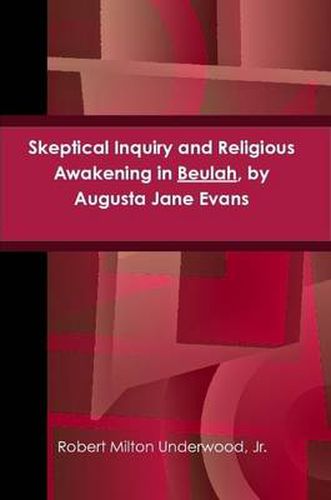Readings Newsletter
Become a Readings Member to make your shopping experience even easier.
Sign in or sign up for free!
You’re not far away from qualifying for FREE standard shipping within Australia
You’ve qualified for FREE standard shipping within Australia
The cart is loading…






This title is printed to order. This book may have been self-published. If so, we cannot guarantee the quality of the content. In the main most books will have gone through the editing process however some may not. We therefore suggest that you be aware of this before ordering this book. If in doubt check either the author or publisher’s details as we are unable to accept any returns unless they are faulty. Please contact us if you have any questions.
Beulah, by Augusta Jane Evans, was hugely successful at the time it was published in America in 1859. A semi-autobiographical account, the author felt it was her duty to warn readers of the problems she had experienced with religious skepticism. Advances in science after the Middle Ages led to the increasing valuation of reason and objectivity. By the early- to mid-nineteenth century it was quite fashionable to be skeptical, especially about religious matters. The eponymous heroine of the novel passes through several phases of religious faith on her intellectual journey of skepticism before she finally reawakens with a mature Christian faith. She eventually learns to properly balance faith and reason.
$9.00 standard shipping within Australia
FREE standard shipping within Australia for orders over $100.00
Express & International shipping calculated at checkout
This title is printed to order. This book may have been self-published. If so, we cannot guarantee the quality of the content. In the main most books will have gone through the editing process however some may not. We therefore suggest that you be aware of this before ordering this book. If in doubt check either the author or publisher’s details as we are unable to accept any returns unless they are faulty. Please contact us if you have any questions.
Beulah, by Augusta Jane Evans, was hugely successful at the time it was published in America in 1859. A semi-autobiographical account, the author felt it was her duty to warn readers of the problems she had experienced with religious skepticism. Advances in science after the Middle Ages led to the increasing valuation of reason and objectivity. By the early- to mid-nineteenth century it was quite fashionable to be skeptical, especially about religious matters. The eponymous heroine of the novel passes through several phases of religious faith on her intellectual journey of skepticism before she finally reawakens with a mature Christian faith. She eventually learns to properly balance faith and reason.